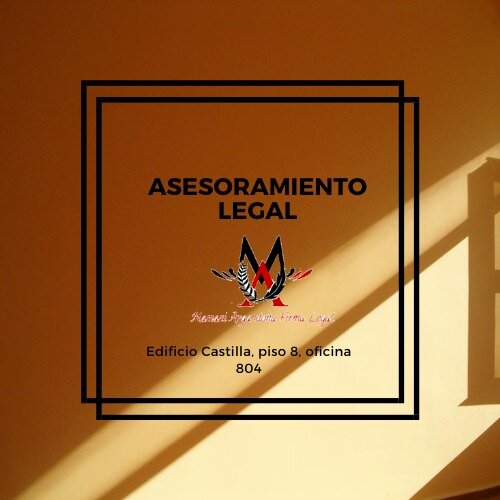Best Water Law Lawyers in La Paz
Share your needs with us, get contacted by law firms.
Free. Takes 2 min.
List of the best lawyers in La Paz, Bolivia
About Water Law in La Paz, Bolivia
Water Law is a fundamental legal domain in La Paz, Bolivia, involving the management, regulation, and protection of water resources. In Bolivia, water is recognized as a strategic resource and a fundamental human right. The legal framework addresses both public and private use of water, allocation among different users, water quality standards, dispute resolution, and sustainable management practices. Since water is vital for residents, agriculture, industry, and urban planning, Water Law in La Paz is designed to ensure fair access and responsible stewardship, balancing competing interests while safeguarding natural resources for future generations.
Why You May Need a Lawyer
Many people in La Paz find themselves in situations where legal expertise in Water Law becomes essential. Some common scenarios include disputes over water rights or access, conflicts involving irrigation or agricultural water use, questions about water service contracts with local providers, and issues regarding pollution or contamination of water sources. Landowners, businesses, indigenous communities, and neighborhood associations may also need legal advice when dealing with government permits or compliance with environmental regulations. A qualified Water Law attorney can help navigate these complexities, represent your interests, and ensure you are following the appropriate legal procedures.
Local Laws Overview
Water Law in La Paz is governed by national legislation, specifically the Law of Water Services (Ley 2066) and the Constitution of Bolivia, which frames water as a collective good. The regulatory body overseeing water resources is the Autoridad de Fiscalización y Control Social de Agua Potable y Saneamiento (AAPS). Local ordinances and regulations further shape water use within urban and rural settings. Important aspects include water rights recognition, licensing and concessions for use, quality standards, penalties for pollution, and mechanisms for participatory management. Indigenous and rural communities also have specific rights to water access based on traditional uses, which are protected under national law. Enforcement and conflict resolution are generally managed by administrative tribunals, though court intervention is sometimes required for complex cases.
Frequently Asked Questions
What constitutes a water right in La Paz, Bolivia?
A water right is a legal entitlement granted by authorities to use surface or underground water for specific purposes such as domestic consumption, irrigation, or industrial use. Rights may be public or private, but are subject to regulation and public interest considerations.
How are water rights obtained?
Individuals or organizations must apply to the relevant government agency, providing justification for use and evidence of no adverse impact on existing users. Rights are typically formalized through a concession or registration certificate.
What happens if there is a dispute over water use or access?
Disputes are often mediated by the regulatory authorities. If agreement cannot be reached, parties may take the case to administrative or civil courts, where the law will determine the outcome based on priority of rights and public interest.
Are there any restrictions on selling or transferring water rights?
Yes. Transfers or assignments of water rights require approval from authorities to ensure that public and environmental interests are protected and that other users are not harmed.
What penalties exist for water pollution or illegal use?
Violations such as unauthorized water usage, diversion, or pollution are penalized with fines, suspension of water rights, or in severe cases, criminal prosecution.
Can communities or indigenous groups claim water rights?
Yes, Bolivian law recognizes the special rights of indigenous and rural communities to access water based on historical and traditional usage, protecting their communal interests and cultural practices.
Is rainwater harvesting regulated?
In urban areas like La Paz, rainwater harvesting is generally encouraged for sustainability. However, large-scale operations may require a permit to ensure that the practice does not affect local hydrology.
Who is responsible for providing and maintaining urban water services?
Municipal water companies, such as EPSAS in La Paz, are responsible for water supply, sanitation, maintenance, and billing under the oversight of national regulators.
How is water quality monitored?
Regulatory bodies regularly test water supplied to consumers and enforce quality standards set by national law. Noncompliance can result in corrective orders or legal action against providers.
What should I do if my water supply is interrupted or contaminated?
Report the issue immediately to your water service provider and regulatory authorities. Legal action can be pursued if providers fail to resolve the problem or if your health and property are harmed.
Additional Resources
For further information and assistance in Water Law matters, consider reaching out to the following organizations and institutions:
- Autoridad de Fiscalización y Control Social de Agua Potable y Saneamiento (AAPS) - The primary regulatory agency for water services in Bolivia.
- Ministerio de Medio Ambiente y Agua - The Ministry responsible for water resources management and environmental protection in Bolivia.
- Defensoría del Pueblo - The Ombudsman’s Office, which can help protect your rights in cases of public services and environmental issues.
- Local universities and environmental NGOs - They often provide information, research, and sometimes legal clinics related to Water Law and resource management.
Next Steps
If you believe you require legal advice or representation in a Water Law matter in La Paz, Bolivia, it is important to start by gathering all relevant documents and facts about your situation. Clearly identify the parties involved and any government communications you have received. Contact a reputable lawyer with experience in Water Law and environmental regulation. Be prepared to explain your objectives and ask about possible approaches, costs, and timelines. You can also consult with local organizations and authorities for preliminary guidance or referrals. Acting promptly and with a clear understanding of your rights will help protect your interests and support the responsible use of water resources in your community.
Lawzana helps you find the best lawyers and law firms in La Paz through a curated and pre-screened list of qualified legal professionals. Our platform offers rankings and detailed profiles of attorneys and law firms, allowing you to compare based on practice areas, including Water Law, experience, and client feedback.
Each profile includes a description of the firm's areas of practice, client reviews, team members and partners, year of establishment, spoken languages, office locations, contact information, social media presence, and any published articles or resources. Most firms on our platform speak English and are experienced in both local and international legal matters.
Get a quote from top-rated law firms in La Paz, Bolivia — quickly, securely, and without unnecessary hassle.
Disclaimer:
The information provided on this page is for general informational purposes only and does not constitute legal advice. While we strive to ensure the accuracy and relevance of the content, legal information may change over time, and interpretations of the law can vary. You should always consult with a qualified legal professional for advice specific to your situation.
We disclaim all liability for actions taken or not taken based on the content of this page. If you believe any information is incorrect or outdated, please contact us, and we will review and update it where appropriate.









